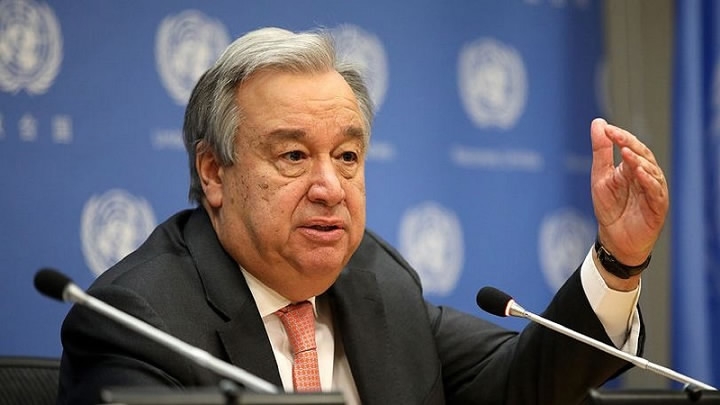UNITED NATIONS, March 19 (Xinhua) -- United Nations Secretary-General Antonio Guterres on Thursday called on world leaders to offer an urgent and coordinated response to this global crisis caused by COVID-19.

File photo: CGTN
"I call on world leaders to come together and offer an urgent and coordinated response to this global crisis," the UN chief said at a press conference via video-link while all UN staff members are required to telecommute so as to mitigate the spread of the virus at UN headquarters in New York.
The secretary-general said that "many countries have exceeded the capacity to care for even mild cases in dedicated health facilities, with many unable to respond to the enormous needs of the elderly. Even in the wealthiest countries, we see health systems buckling under pressure."
"Health spending must be scaled up right away to meet urgent needs and the surge in demand - expanding testing, bolstering facilities, supporting health care workers, and ensuring adequate supplies - with full respect for human rights and without stigma," he said.
"It has been proven that the virus can be contained. It must be contained," the secretary-general noted. "If we let the virus spread like wildfire - especially in the most vulnerable regions of the world - it would kill millions of people."
Guterres stressed that "we need to immediately move away from a situation where each country is undertaking its own health strategies to one that ensures, in full transparency, a coordinated global response, including helping countries that are less prepared to tackle the crisis."
"Governments must give the strongest support to the multilateral effort to fight the virus, led by the World Health Organization, whose appeals must be fully met," he said. "The health catastrophe makes clear that we are only as strong as the weakest health system."
The UN chief also called on the international community to focus on the social impact of the virus and the economic response and recovery.
"Unlike the 2008 financial crisis, injecting capital in the financial sector alone is not the answer. This is not a banking crisis - indeed banks must be part of the solution," said the secretary-general.
"And it is not an ordinary shock in supply and demand; it is a shock to society as a whole," the UN chief noted.
"The liquidity of the financial system must be guaranteed, and banks must use their resilience to support their customers," he said. "Let's not forget this is essentially a human crisis."
The secretary-general said that focus must be on people, especially the most vulnerable, low-wage workers, small and medium enterprises. "That means wage support, insurance, social protection, preventing bankruptcies and job loss."
"That also means designing fiscal and monetary responses to ensure that the burden does not fall on those who can least afford it," he added.
"The recovery must not come on the backs of the poorest - and we cannot create a legion of new poor," said the UN chief.
"We need to get resources directly in the hands of people. A number of countries are taking up social protection initiatives such as cash transfers and universal income. We need to take it to the next level to ensure support reaches those entirely dependent on the informal economy and countries less able to respond," he added.
The UN chief hailed G20 leaders' efforts to protect their own citizens and economies by waiving interest payments.
"We must apply that same logic to the most vulnerable countries in our global village and alleviate their debt burden," he said.
"Across the board, we need a commitment to ensure adequate financial facilities to support countries in difficulties. The International Monetary Fund, the World Bank and other international financial institutions play a key role," Guterres said.
"We are facing a global health crisis unlike any in the 75-year history of the United Nations - one that is spreading human suffering, infecting the global economy and upending people's lives," said the UN chief.
Noting that a global recession - perhaps of record dimensions - is a "near certainty," the secretary-general said that the International Labour Organization has just reported that workers around the world could lose as much as 3.4 trillion U.S. dollars in income by the end of this year.
Guterres was also concerned about a possible "human crisis" as a result of the wide spread of the virus.
"Our human family is stressed and the social fabric is being torn. People are suffering, sick and scared," he said.
Stressing that current responses at the country level will not address the global scale and complexity of the crisis, Guterres said that "this is a moment that demands coordinated, decisive, and innovative policy action from the world's leading economies."
"My central message is clear: we are in an unprecedented situation and the normal rules no longer apply. We cannot resort to the usual tools in such unusual times," he said.
The secretary-general also asked attention be given to women and children and other vulnerable people, as the women are "disproportionally carrying the burden at home and in the wider economy" and children are also "paying a heavy price."
Recalling the mission of the United Nations, Guterres said that "we have a framework for action - the 2030 Agenda for Sustainable Development and the Paris Agreement on Climate Change. We must keep our promises for people and planet."
"The United Nations - and our global network of country offices - will support all governments to ensure that the global economy and the people we serve emerge stronger from this crisis," he added.
In this regard, "global solidarity is not only a moral imperative, it is in everyone's interests," said the UN chief.


